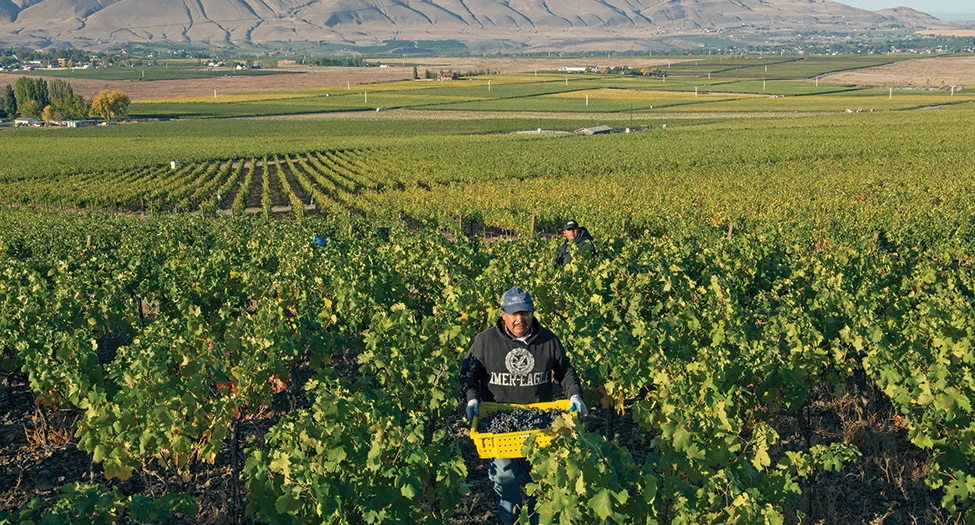
Home » WA workers could be harmed by H-2A visa expansion
WA workers could be harmed by H-2A visa expansion

Washington is one of five states most dependent on H-2A workers in the country -- whose numbers have ballooned in the last decade to about 33,000.
Courtesy Andréa Johnson Photography/Washington State Wine CommissionJune 29, 2025
Advocates for immigrants' rights in Washington state are voicing concerns about the possible expansion of the H-2A visa program, which they say exploits migrant workers.
Washington is one of five states most dependent on H-2A workers in the country -- whose numbers have ballooned in the last decade to about 33,000.
Edgar Franks, political director for the independent farmworker union Familias Unidas por la Justicia, based in Skagit County, said farm labor shortages caused by mass deportations could increase reliance on the program, and H-2A workers often face wage theft and poor housing.
“Being crammed into a small room, or if you’re in a place where it’s really hot, there’s no ventilation or air conditioning,” said Franks. “The bathrooms are lacking in sanitation. Sometimes they give mattresses with bed bugs in them.”
From 2018 to 2023, the Department of Labor found nearly 70,000 violations against employers of H-2A workers - the most common was wage theft.
Two Richland-based farmworker contractors have recently faced scrutiny from state labor and justice officials regarding alleged abuses of workers related to the H-2A program.
Pacific Agri Services LLC is facing $1.25 million fine from the state Department of Labor & Industries for allegedly violating workers’ rights. Most of those impacted were domestic workers, state labor officials said, though more than two dozen were H-2A workers. The company is appealing the fine.
King Fuji Ranch is reforming its hiring practices and paying a fine to the state Attorney General’s Office after an investigation found that the fruit grower was discriminating against and misrepresenting job opportunities for local farmworkers, ostensibly to more easily hire H-2A workers.
“Employers cannot discriminate against willing, available local workers in order to abuse foreign visa programs,” Attorney General Nick Brown said in a statement when the agreement with King Fuji Ranch was announced.
U.S. Rep. Dan Newhouse, R-WA, wants to expand the H-2A program through the Farm Workforce Modernization Act, which he says would ease burdens on farmers. Newhouse has introduced the bill annually since 2019 and this year it is co-sponsored by U.S. Rep. Zoe Lofgren, D-CA.
“This legislation is necessary to lay the groundwork for continued negotiations, and I am committed to working closely with my colleagues to enact long-term, durable reforms to our agriculture guest worker programs,” Newhouse said in a statement when he reintroduced the bill. “This issue has been, and remains, my top priority and unified Republican government is an opportunity to deliver for our farmers and ranchers.”
Franks said one of the problems with the program is that workers' visas are connected to a specific employer, giving that employer too much control.
If a worker is laid off or fired, their visa becomes invalid and they must leave the country immediately.
“It’s really hard for workers to really speak up,” said Franks, “and talk about their wages, or make formal complaints, because of fear of retaliation.”
U.S. companies should raise their wages in Mexico, added Franks, which would reduce the need for people to go North.
He also called for workers who have already been working in the state, sometimes for decades, to be legalized.
“If you have workers that are protected and paid well and treated well,” said Franks, “that’s in the interest of the whole nation. We should recognize that and really step up for farmworkers.”
The Tri-Cities Area Journal of Business contributed to this report.
This story is republished from Public News Service, an independent, member-supported news organization and Certified B Corporation committed to increasing awareness of and engagement with critical public interest issues by reporting and delivering credible journalism and media packages through a network of independent state newswires.
Latest News Local News Agriculture Labor & Employment Workforce & Talent
KEYWORDS June 2025
Related Articles
Related Products





